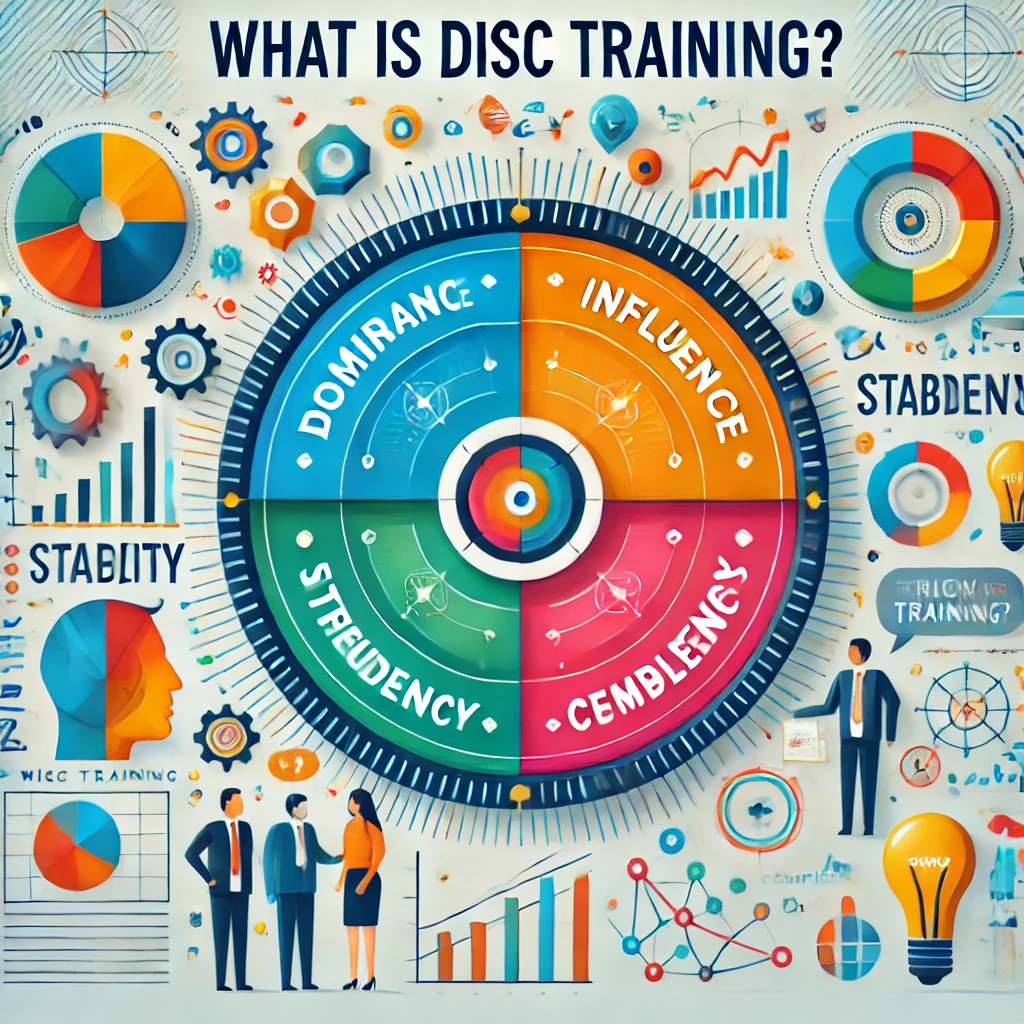What is Disc Training: The Ultimate Guide
What is DISC training? DISC training is a tool for understanding behavioural styles and improving personal and professional interactions. It categorizes behaviour into four dimensions: Dominance, Influence, Stability, and Compliance. This guide will explain the principles of DISC training, its applications, and its benefits.
Key Takeaways
- DISC Training assesses four behavioural dimensions: Dominance, Influence, Stability, and Compliance. It aims to enhance personal and professional interactions.
- The assessment process is straightforward, providing immediate feedback on individual behavioural styles, which can be tailored for improved communication and team dynamics.
- Organizations utilizing DISC Training report benefits such as enhanced self-awareness, better teamwork, and effective communication, leading to a more productive work environment.
Understanding DISC Training
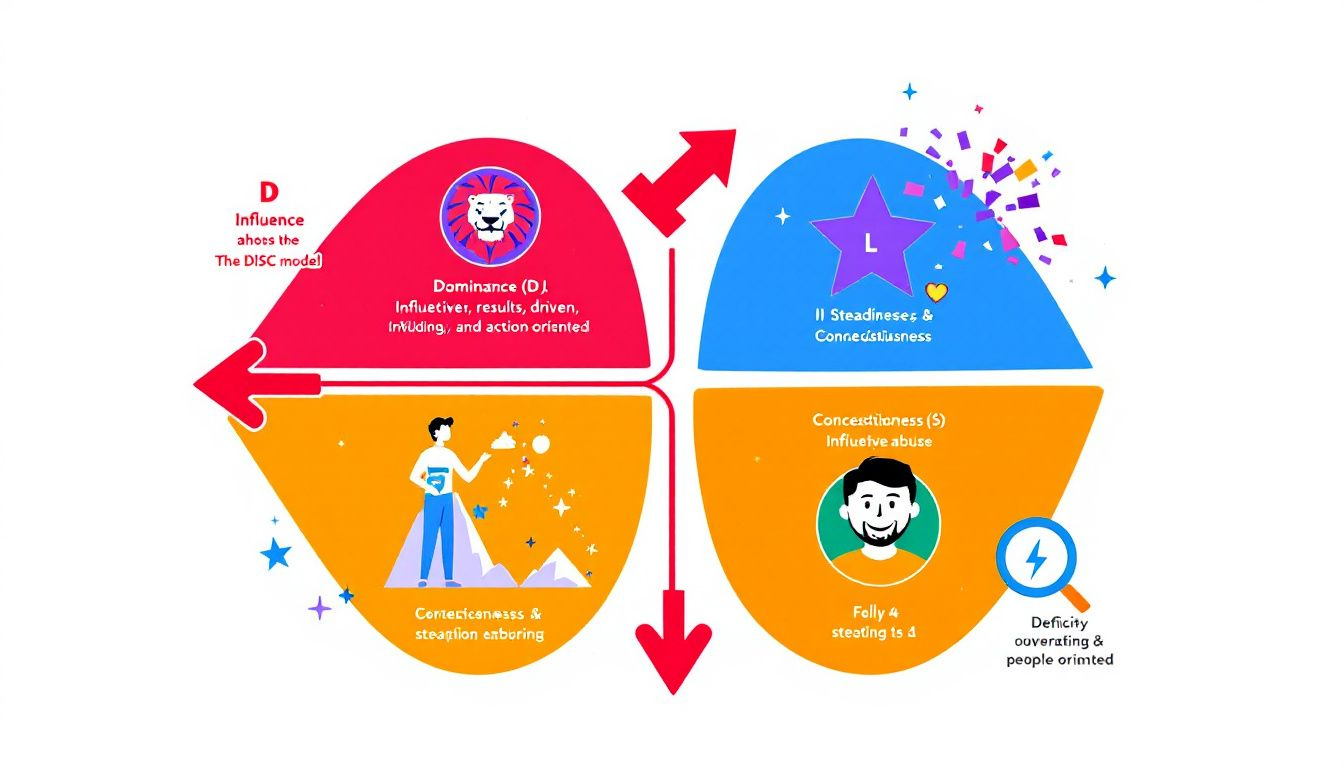
DISC Training is a behavioural assessment that focuses on measuring individual behavioural styles and preferences. Unlike clinical personality assessments, DISC does not delve into emotional health but aims at understanding normal human behaviours. This makes it an accessible tool for anyone looking to enhance their personal and professional interactions using the disc personality framework.
At the heart of DISC is the identification of four main dimensions of behaviour:
- Dominance
- Influence
- Steadiness
- Compliance
These dimensions are not just abstract concepts; they are practical tools that reveal individual strengths and promote personal development. Taking the DISC assessment honestly can provide insights into aspects that lead to significant growth and improvement.
The simplicity and practical application of DISC make it a popular choice for many. Whether you’re a leader looking to understand your team’s dynamics better or an individual seeking personal growth, DISC Training offers valuable insights. The next sections will delve deeper into the four quadrants of DISC, providing a comprehensive understanding of each.
Ready to leverage the power of DISC to enhance your personal and professional growth? Let’s explore your unique behavioural style together. Schedule your call now.
The Four Quadrants of DISC
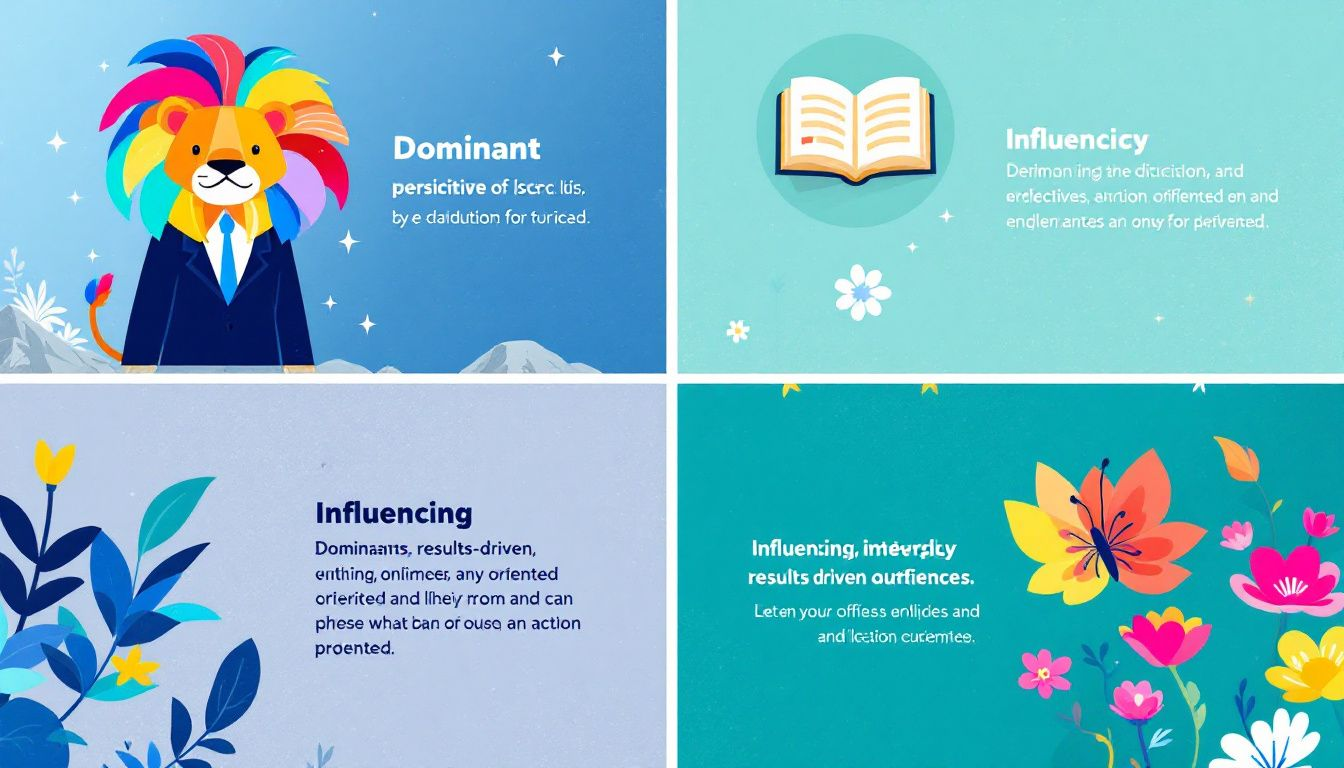
The DISC model is built around four distinct quadrants: Dominance, Influence, Steadiness, and Conscientiousness. Each quadrant reflects specific behavioural tendencies, providing a detailed map of human behaviour. Understanding these quadrants is key to unlocking the full potential of DISC Training.
Each DISC style represents a unique set of traits and behaviours. Exploring each quadrant in detail helps you better understand yourself and others. This understanding fosters improved communication, enhanced teamwork, and effective conflict resolution. Let’s dive into each quadrant to discover what makes them unique.
Dominance
Individuals with a Dominance style are characterized as direct, results-oriented, and decisive. They thrive in competitive environments and are effective problem solvers. For them, confidence is key, and achieving bottom-line results is a top priority.
High Dominance individuals focus on getting immediate results and taking decisive action. They challenge themselves and others, making them natural leaders in many situations. Understanding this style can help in leveraging their strengths while complementing other styles to create a balanced team dynamic.
Curious about how a Dominance style influences your leadership or team interactions? Book a 15-minute consultation to delve deeper into your DISC profile. Schedule here.
Influence
The Influence quadrant is all about charm, enthusiasm, and optimism. Individuals with this style are persuasive and inspiring, making them excellent at building relationships. Their sociable nature and collaborative traits are vital for effective communication within teams.
High Influence scores indicate a person who excels in roles requiring teamwork and collaboration. They are open and tend to inspire others, driving forward momentum in group settings. Understanding and leveraging these traits can significantly enhance team cohesion and effectiveness.
Harness the power of Influence in your interactions! Let’s uncover strategies tailored to your DISC style. Click to book your call.
Steadiness
Steadiness is characterized by cooperation, sincerity, and dependability. Individuals with this style prefer calm and supportive environments where they can be reliable and provide consistent support. Their calmness and supportiveness are essential for maintaining stability within a team.
People with high Steadiness scores are often the glue that holds teams together. Their preference for a calm environment helps in reducing stress and creating a supportive atmosphere. Understanding this style can aid in fostering a more cohesive and harmonious team dynamic.
Conscientiousness
Those with a Conscientiousness style prioritize quality and attention to detail. They are characterized by a strong emphasis on accuracy and analytical thinking. This style is crucial for roles that require meticulousness and thoroughness in work.
Individuals with high Conscientiousness scores are often strong-willed and focused on personal development. Their behavioural style ensures that tasks are completed with precision and care. Understanding and valuing this style can lead to higher-quality outcomes and more efficient processes within teams.
How DISC Training Works
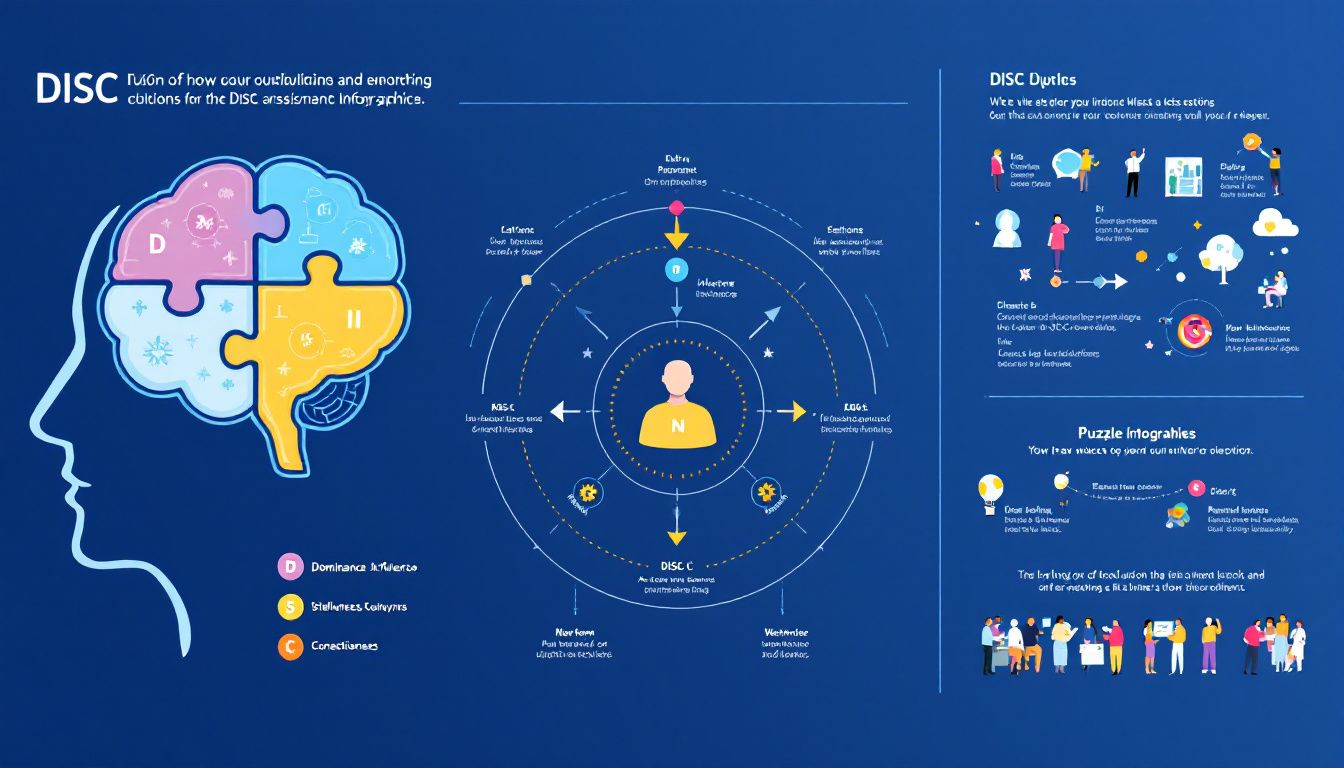
DISC Training is simpler to interpret and apply compared to other personality assessments, making it accessible for a wide range of users. The process typically includes a structured questionnaire that participants complete to determine their behavioural styles. Once the assessment is done, effective interpretation of results enables individuals to understand their preferences better and apply this knowledge in various settings.
The assessment process, interpreting the DISC profile, and applying DISC insights are integral parts of how DISC Training works. Each step provides valuable insights that can be used to enhance personal and professional interactions. Let’s explore these steps in detail.
The Assessment Process
Participants in a DISC assessment respond to a series of questions that help reveal their behavioural styles. The Thomas Personal Profile Analysis (PPA) method involves individuals picking traits to describe themselves multiple times. Typically, participants face a total of 96 options during the assessment process.
The DiSC assessment questionnaire uses a five-point scale for responses. There are no right or wrong answers, and the results are available immediately after completion. The assessment assigns a main personality type and secondary characteristics, providing a detailed report about personality and behaviour, including a personality test.
Interpreting Your DISC Profile
The DISC profile report includes information about personal behavioural style, tendencies, needs, preferred environment, and strategies for effective behaviour. The results explain the percentage of each style and their implications for behaviour and interactions. Facilitators may use DISC profiles to provide an understanding of teams, groups, clients, or colleagues.
It’s important to note that the DISC profile does not indicate job suitability. There are no preferred styles or value judgments, meaning all behavioural styles are valid. This inclusive approach ensures that everyone can benefit from DISC Training.
Applying DISC Insights
DISC training aids individuals in recognizing their communication behaviours and responses to stress. Leaders can tailor their communication styles to align with their team’s preferences, improving engagement. DISC assessments provide a common language for understanding behaviours, contributing to better teamwork.
Creating optimal environments for teamwork is facilitated by DISC tests through constructive criticism. Communication is the foundation of great teams, further improved through DISC training. Leaders can adapt their styles to various situations for better outcomes, enhancing overall team performance.
Benefits of DISC Training
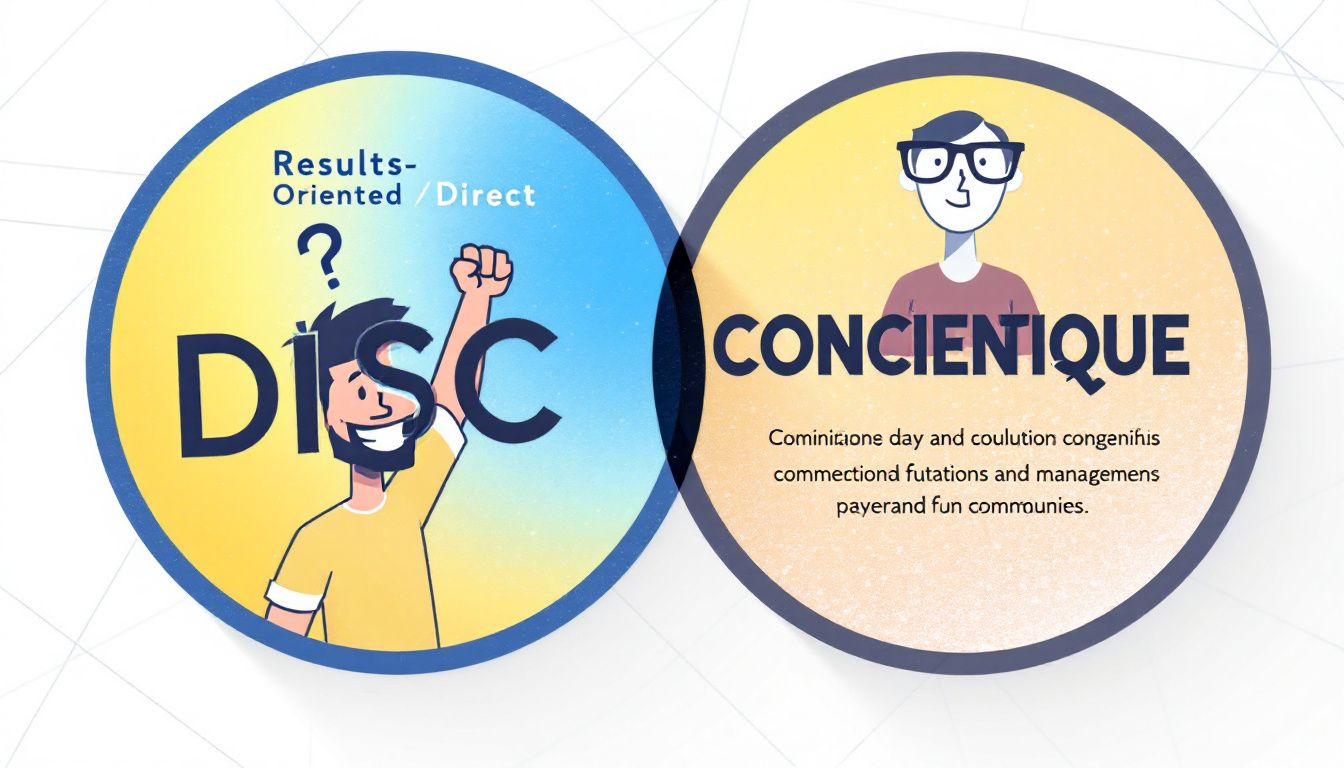
Effective DISC training leads to a more engaged, collaborative, and adaptive culture that drives results. Understanding the benefits of DiSC attributes can enhance leadership and team dynamics within an organization. The training supports professional development, individual roles, and improved team cohesion.
Individuals who undergo DISC training gain improved teamwork and enhanced self-awareness. Understanding communication preferences through DISC assessments leads to a more cohesive work environment. DISC training is widely recognized for its effectiveness in fostering better interactions within teams and organizations.
Imagine improved teamwork, better communication, and enhanced self-awareness for your organization. Start the journey today by booking a 15-minute consultation. Schedule now.”
Enhanced Self-Awareness
Self-awareness is crucial for success and positive growth, as it enables individuals to recognize their behaviour patterns. Increased self-awareness among staff is a primary benefit of DISC assessments. Understanding interactions with different personality types leads to personal growth.
DISC training enhances the ability of individuals to evaluate themselves objectively, fostering deeper self-knowledge. Employees can gain significant self-knowledge by understanding their motivations and responses to conflict. This self-awareness helps identify strengths and weaknesses, allowing for targeted improvement.
Improved Team Dynamics
DISC assessments are designed to help individuals understand their behavioural tendencies and improve team dynamics. By identifying and understanding diverse behavioural styles within a group, effective team dynamics can be promoted. Employing DISC insights fosters an ongoing language of teamwork, enhancing collaborative efforts.
Organizations apply DISC training to enhance team collaboration and effectiveness. Regularly embedding DISC principles into daily operations can enhance team dynamics and communication. A financial services company found that DISC training led to increased employee engagement and productivity.
Effective Communication
DISC insights can be used to enhance communication strategies and improve workplace relationships. Recognizing different DISC styles enables tailored communication strategies, enhancing workplace interactions. Understanding one’s own DISC profile can lead to healthier workplace cultures by improving communication.
Tailoring presentations to different personalities and understanding clients’ characteristics improves interactions and creates better customer service experiences. Knowing personal and audience personalities helps make real human connections with prospects and customers.
DISC Training in the Workplace
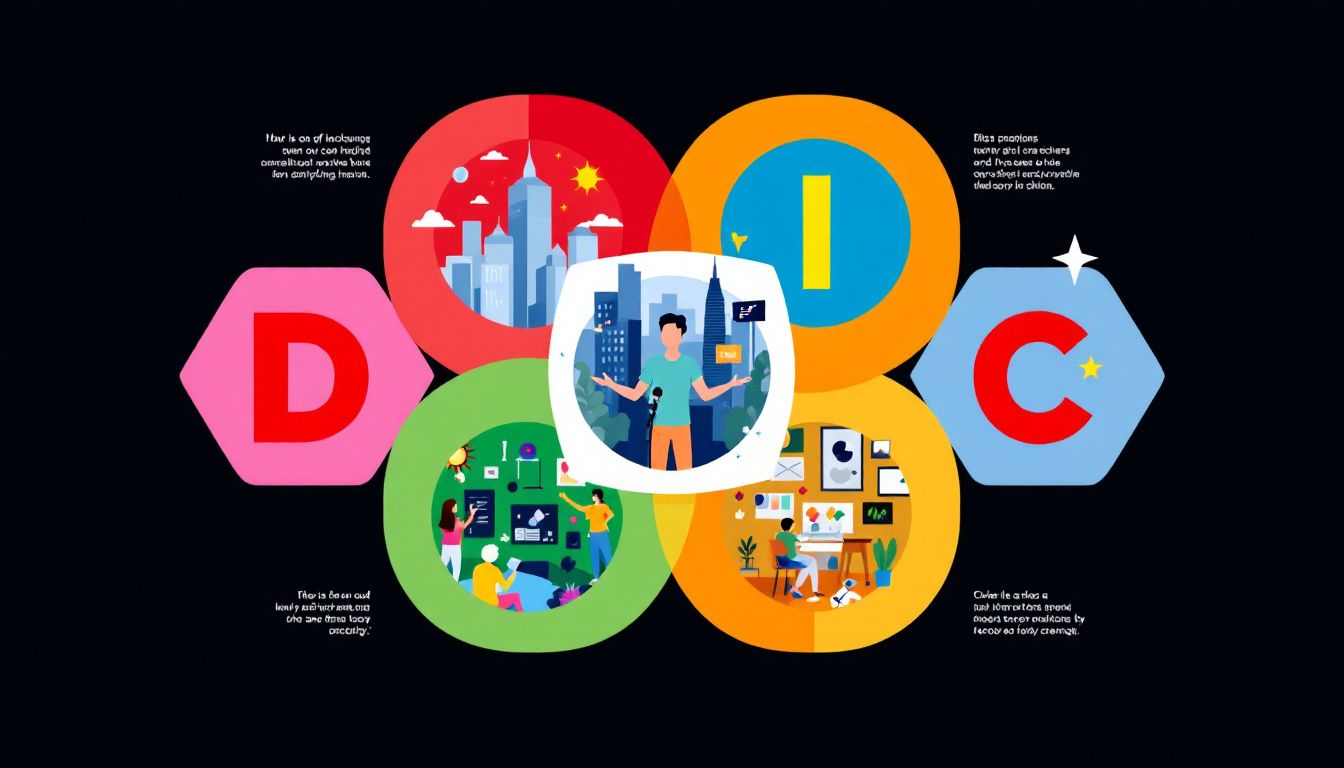
DiSC training is utilized by organizations to foster teamwork, communication, and productivity. The DISC assessment tool has been utilized by over 40 million individuals, promoting better communication among teams and leaders. Spectrum Health used behavioural assessments to enhance communication among healthcare providers, leading to improved patient outcomes and job satisfaction.
A case study showed that a healthcare institution improved patient care by using DISC training to enhance teamwork among staff. By integrating DISC principles, organizations can create a more cohesive and effective work environment, driving overall success.
Leadership Development
Incorporating DISC principles into onboarding processes helps new employees understand team dynamics from the outset, fostering leadership and collaboration. Selecting a program supported by an authorized partner can enhance implementation, ensuring leaders gain the most benefit from the training.
DISC training is crucial for enhancing leadership skills as it provides valuable insights into understanding team dynamics and personal leadership styles. This understanding is key to developing effective leaders who can drive their teams to success.
Leadership starts with understanding yourself and your team. Book a call to learn how DISC Training can transform your leadership style. Click here.
Conflict Resolution
Understanding DISC profiles can assist managers in developing tailored communication strategies. Recognizing different DISC styles helps teams reduce misunderstandings that lead to conflict. Facilitators can leverage DISC profile reports to enhance group understanding and interactions.
By using DISC profiles, managers can identify specific communication styles, aiding in the resolution of conflicts. This approach ensures a more harmonious and productive work environment, reducing the negative impact of conflicts.
Struggling with team conflicts? Let DISC Training provide the tools you need for resolution. Schedule your free 15-minute consultation now. Book your call.
Sales and Customer Service
Sales teams can utilize DISC training to customize their sales strategies according to the personality traits of their clients. This tailored approach enhances persuasiveness and improves the overall sales process. Understanding the diverse customer personalities helps sales professionals connect more effectively, leading to higher client satisfaction.
DISC training equips sales teams with strategies to connect with diverse customer personalities effectively. A technology firm, for example, improved its sales strategy through DISC training, resulting in higher client satisfaction and increased sales.
This demonstrates the transformative potential of DISC training in sales and customer service environments around the world.
Implementing DISC Training Programs
Engagement can be enhanced in DISC training by incorporating interactive methods like role plays and team exercises. Personalizing the training to address specific team needs increases its relevance and effectiveness. Creating a supportive and confidential atmosphere helps team members feel comfortable sharing their behavioural styles.
Follow-up support after DISC training is essential for encouraging the application of learned concepts and continuous development. Regular refresher sessions are recommended to maintain the effectiveness of DISC training. Effectively implementing DISC training is crucial to maximize its benefits within an organization.
Choosing the Right Program
It is recommended that you evaluate the specific needs of your organization when selecting a DISC training program. Consider the specific challenges your team faces to ensure the chosen program addresses those effectively. This tailored approach ensures that the training is relevant and impactful for your team.
Different programs offer various levels of depth and focus. Selecting a program that aligns with your organizational goals and team dynamics will maximize the benefits of DISC training. This careful selection process is the first step toward successful implementation.
Integrating DISC into Company Culture
Integrating DISC principles into company culture fosters better communication and collaboration among team members. Implementing DISC assessments can help identify specific behavioural styles within teams, allowing for tailored communication approaches. Regular workshops focused on DISC principles enhance employees’ understanding and application of these concepts in daily interactions.
Providing teams with DISC feedback facilitates constructive discussions about individual and collective strengths and improvement opportunities. Establishing a measurement framework to evaluate the effectiveness of DISC integration ensures that the initiative continuously aligns with organizational goals.
Measuring Success
Measuring success in DISC training is crucial to ensure the programs deliver the desired outcomes for individuals and organizations. Effectiveness can be evaluated through various metrics, including participant feedback, behavioural changes observed, and overall organizational performance improvements.
Benefits of DISC training include enhanced self-awareness, improved team dynamics, and effective communication, which are vital indicators of successful training. Real-life examples demonstrate how organizations that successfully implemented DISC training saw significant improvements in collaboration, conflict resolution, and employee satisfaction.
Real-Life Examples of DISC Training Success
Organizations that utilized Everything DiSC profiles reported significant improvements in team collaboration and communication. Real-life examples of DISC training success illustrate the transformative effects on organizations and individuals. For instance, a financial services company saw increased employee engagement and productivity after implementing DISC training.
Another case study showed that a healthcare institution improved patient care by using DISC training to enhance teamwork among staff. These examples highlight the practical benefits and positive outcomes of DISC training in various settings, demonstrating its value in fostering a more effective and harmonious workplace.
Be the next success story! Learn how DISC Training can drive real results for you and your team. Book a free call to get started. Schedule here.
Summary
In summary, DISC Training offers a powerful tool for understanding and leveraging behavioural styles to enhance personal and professional interactions. By exploring the four quadrants of DISC—Dominance, Influence, Steadiness, and Conscientiousness—we gain valuable insights into our own behaviours and those of others. Implementing DISC training in the workplace fosters better communication, improved team dynamics, and effective conflict resolution.
The benefits of DISC training are far-reaching, from enhanced self-awareness to improved sales strategies and customer service. Real-life examples further illustrate its transformative potential. Embracing DISC principles can lead to a more engaged, collaborative, and adaptive culture, driving success in any organization.
Frequently Asked Questions
What is the purpose of DISC Training?
The purpose of DISC Training is to enhance self-awareness and improve communication and team dynamics by measuring individual behavioural styles and preferences. This helps individuals and organizations work more effectively together.
How does the DISC assessment process work?
The DISC assessment process involves participants answering a set of questions that uncover their behavioural styles. This leads to a comprehensive report detailing their personality traits, strengths, and opportunities for growth.
What are the benefits of DISC Training in the workplace?
DISC Training enhances teamwork, communication, and leadership by offering insights into diverse behavioural styles, which aids in conflict resolution and improves sales and customer service strategies. Implementing this training can lead to a more harmonious and productive workplace.
How can DISC Training improve communication?
DISC Training enhances communication by equipping individuals to recognize and adapt to different DISC styles, fostering healthier workplace dynamics and improving interactions with clients and colleagues.
What are some real-life examples of DISC Training success?
Many financial services and healthcare organizations have successfully enhanced team collaboration, communication, and productivity through the implementation of DISC training. This demonstrates the effectiveness of DISC training in real-world settings.
Want to experience these benefits firsthand? Book a free 15-minute DISC consultation today and discover how to transform your team’s dynamics. Click here to schedule.
